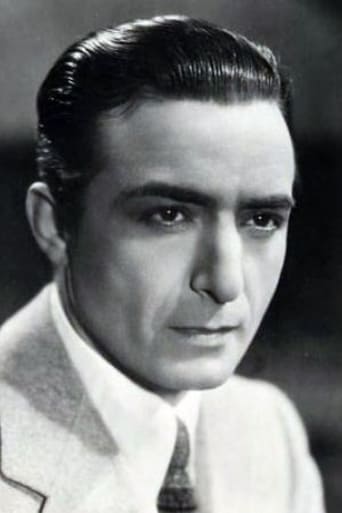disinterested_spectator
Some critics say this is an important, thought-provoking film. I guess they are right, because it provoked me to think about a question that has bothered me for some time: Why do I keep watching these dumb foreign films just because critics tell me they are important and thought provoking? As is typical for a dumb foreign film, there is a lot of decadent sex. For example, the protagonist figures his half-brother is giving their mother morphine and having sex with her, so he has a fellow fascist slap him around. And by George, that is the last we hear about that! I guess this is what foreign directors call "character development." If so, there is plenty more character development in this movie. Anyway, as the title indicates, the protagonist just wants to conform and be like everyone else. So I guess he figures a good way to conform is by being an assassin. And to have more character-developing sex.
Leofwine_draca
A study of how fascism can lead to murder, THE CONFORMIST is a slow-burning art-house flick that's undeniably well made by all involved. This is high brow entertainment indeed: understated, subtle, with plenty of meaning behind the dialogue to appeal to the intellectual crowd. Bertolucci also works hard to make this an atmospheric film, although as with a lot of 'arty' directorial work there's a certain coldness to this, a lack of empathy with the leading characters.Still, there are moments in THE CONFORMIST which are undeniably powerful, not least that powerhouse scene that takes place in the woods. This is one of the most shocking and upsetting sequences I've watched in a while, and it makes that slow burn all the more worthwhile. The cast give faultless performances and the technical values are proficient, but at times this is a film that seems to be slow just for the sake of it, more of an exercise in patience testing than anything else.
Scott44
***It has spoilers, but EThompsonUMD ("An unforgettable masterpiece. Finally available on DVD!!!!!!", EThompsonUMD from Massachusetts, 25 February 2005) has a nice review. I also like the comments by italtrav ("Brilliant film making", italtrav from NYC, 23 June 2004). Another fine review is from junkielee ("Masterpiece!!", junkielee from Cairo, Egypt, 7 November 2013).*** The Conformist (1970, Bernardo Bertolucci), a return to Benito Mussolini's Italy, is profound, one of the great cinematic achievements of the last century. Filled with ideas, oozing with style, relevant to societies (like the US today) on the verge of total collapse and richly satisfying, Bernardo Bertolucci's eye-opener invites passionate discussion on its meaning.Set during the rise and fall of Mussolini, "The Conformist" follows a young Italian man Marcello Clerici (Jean-Louis Trintignant, who is actually French), who aspires to become a made-man with the Fascists. To get in, Marcello must enable the assassination of his former philosophy professor, now a prominent democracy-activist. The narrative is non-linear, and we soon realize that Marcello is repressed. He has strong homosexual tendencies. He is particularly haunted by a major incident in his childhood; i.e., thirteen-year-old Marcello has his first sexual encounter with a man and it leads to a violent conclusion. As an adult Marcello is determined to be regarded as normal, so he marries the extremely pretty and sensual Giulia ( Stefania Sandrelli), even though he hates her lack of intellectual depth. When the couple are honeymooning, he makes arrangements to meet up with Professor Quadri (Enzo Tarascio). He is instantly floored by Quadri's beautiful, bisexual wife, Anna (Dominique Sanda). Although Marcello quickly makes a pass with her, it seems he is more attracted by her liberation. As Marcello, Giulia, the Professor and Anna become more intimately acquainted with each other the more the very awake Anna reveals herself as the most compelling character of all. Will Marcello go through with it? Visually it looks amazing. The combination of Bertolucci and famed cinematographer Vittorio Storaro is dazzling. Bertolucci really chooses color well. Storaro is the master of under-exposure. The combination of Bertolucci's imagery and Storaro's cinematography creates a sense that you are watching living history unfold.Another reviewer points out that Bertolucci is deviating from the Alberto Moravia novel which has an omniscient perspective. Instead, Bertolucci focuses on the troubled, unreliable Marcello for point of view. There are many examples where Bertolucci suggests a peculiar mindset. For example, Marcello has a thug beat up his drug-addicted Mother's chauffeur and lover. Curiously, the man taking the beating does not resist. (In other words, victims are not really being victimized.) When Marcello meets his father in a sanitarium, it appears like the father's agitation is being directed in opposition to Marcello's obvious connection with the Fascists. (That is, resisting the Fascists is a crazy thing to do.) When Marcello is announcing his intention to marry Giulia to be perceived as normal, he is in a nightclub with singers performing in the background. (So the distracted audience fails to notice Marcel is repressed or strange in any way.) However, perhaps the most visually identifying moment for Marcello follows a very erotic dance between Anna and Giulia in a nightclub. Their dancing arouses all the other patrons. Eventually all the patrons are dancing in one large circle clockwise around Marcello. At the center of the storm, Marcello is turning counter-clockwise, refusing to be pulled in with the senseless pleasure experienced by those around him. Shortly after the circle dance Marcello commits his perfidy. So, he wasn't a conformist after all. His move towards Fascism wasn't out of cowardice; he had the courage to resist the rest. He never deceived anyone; the others were not paying attention.An interesting theme is Plato's Allegory of the Cave. This was the subject of Marcel's graduate thesis. The scene with Marcello discussing it in Professor Quadri's office, with the two bathed in shadow, directly comments on it. Plato's allegory is also relevant to the late betrayal of the blind Fascist radio announcer. Just as Plato's narrator suddenly perceives reality after a lifetime of staring at shadows, so too does the blind propagandist learn the awful truth about a perceived comrade he has never seen."The Conformist" works on so many levels that it should be seen whenever possible. Here's a closing thought for those who think that joining a Secret Police is so damn cool: There exists someone like Anna in every life that makes attachment with strangers worthwhile.









